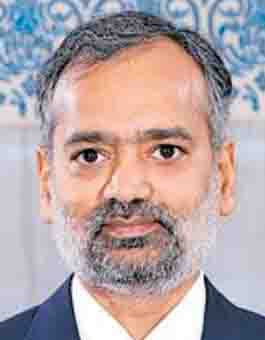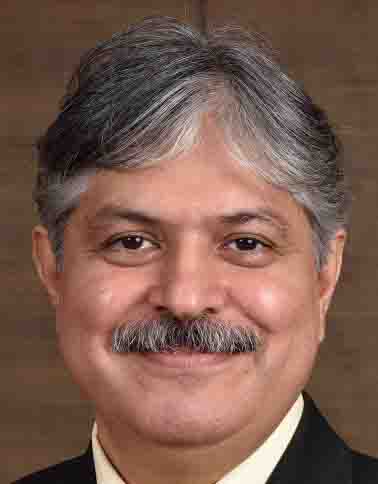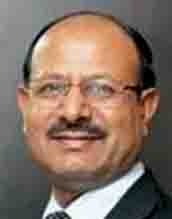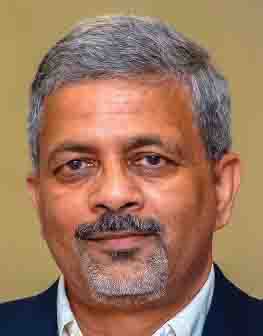
The past year saw several leadership changes, at the ministerial level as well as in leading power companies. R.K. Singh continued as union minister of state (independent charge) for power and new and renewable energy for a second term. A new power secretary was appointed in a bureaucratic reshuffle. Meanwhile, the Ministry of Coal (MoC) saw a change of guard with a new union minister and a new secretary taking charge. Power public sector undertakings (PSUs) including the Central Electricity Authority (CEA), REC Limited, Bharat Heavy Electricals Limited (BHEL) and Power Grid Corporation of India Limited (Powergrid) saw key appointments being made. There were some executive changes in leading private sector power companies as well. A look at the key changes at the top over the past year…
PUBLIC SECTOR
 R.K. Singh, Union Minister of State (Independent Charge), Ministry of Power and New and Renewable Energy
R.K. Singh, Union Minister of State (Independent Charge), Ministry of Power and New and Renewable Energy
In June 2019, R.K. Singh took charge as union minister of state (independent charge) for power and new and renewable energy, a portfolio which has been reassigned to him. In his previous stint as power minister, Singh is credited with having achieved near-universal household electrification under the Saubhagya scheme, providing power to over 26 million households. Interacting with the media after taking charge, Singh said that his priorities would be to ensure the availability of quality, reliable and affordable power. “We will overcome the challenges and maintain the pace of growth in the power sector,” he said. The minister also emphasised on working towards achieving the right energy mix to meet the country’s international obligations. A number of challenges lie ahead for the minister in his second innings. These include accelerating the pace of renewable energy capacity addition, addressing the issue of discom dues and speeding up the roll-out of UDAY II.
Singh is a 1975 batch IAS officer of the Bihar cadre and is former secretary, Ministry of Home Affairs.
 Prahlad Joshi, Union Minister, MoC
Prahlad Joshi, Union Minister, MoC
Prahlad Joshi took over as minister of coal in May 2019, succeeding Piyush Goyal, who is now handling the commerce and railway portfolios. In addition to coal, Joshi has been assigned the ministries of parliamentary affairs and mines.
Since he assumed office, a significant initiative has been the easing of FDI norms in coal mining, which is expected to attract international players to create an efficient and competitive coal market. For coal mining and other associated infrastructure (washeries, crushing, etc.), the government has decided to allow 100 per cent FDI via the automatic route. The government has also announced 100 per cent FDI in contract manufacturing via the automatic route.
In the past, Joshi has been a member of the Business Advisory Committee; the Consultative Committee, Ministry of Urban Development, Housing and Urban Poverty Alleviation; and the Committee on Ethics. He has also been chairperson of the Standing Committee on Petroleum and Natural Gas; member, General Purposes Committee; as well as member, Committee on Privileges in Parliament, among others, during his long tenure as a parliamentarian since 2004.
 S.C. Garg, Secretary, MoP
S.C. Garg, Secretary, MoP
In July this year, S.C. Garg took over as secretary, Ministry of Power (MoP), from A.K. Bhalla, who has now been appointed as officer on special duty (OSD) in the Ministry of Home Affairs.
Garg is a 1983 batch IAS officer of the Rajasthan cadre. Prior to his current role, he served as scretary, Department of Economic Affairs, Ministry of Finance, and was in charge of fiscal policy and RBI-related matters. He was also closely involved in the preparation of the union budget. In the past, he has served as executive director at the World Bank.
Speaking to the media shortly after taking charge, Garg said, “The power sector is an extremely important constituent of the vision of making the country a $5 trillion economy by 2024-25 and a $10 trillion economy by 2032. This dream cannot be realised unless the power sector performs. Economic growth is heavily dependent on the power sector’s performance.”
 S.N. Sahai, Special Secretary, MoP
S.N. Sahai, Special Secretary, MoP
Sanjeev Nandan Sahai was elevated to the position of special secretary, MoP, in July 2019. Prior to this, he had held charge as additional secretary, MoP, since March 2018. He was previously finance secretary with the Delhi government.
Sahai is a 1986 batch IAS officer. He has several assignments to his credit. He was a key member in the Prime Minister’s Office (1998-2003), where he was involved with, amongst other things, the formulation of strategies and policies for infrastructure development, including the National Highways Development Project, through private sector participation.
In his current role, Sahai will lead a high-level group to make recommendations for changing the structure and system of power sale and purchase in the country.
 Anil Kumar Jain, Secretary, Ministry of Coal
Anil Kumar Jain, Secretary, Ministry of Coal
In September 2019, Anil Kumar Jain was appointed secretary, Ministry of Coal. He replaced Sumanta Chaudhuri. Jain is a 1986 batch IAS officer of the Madhya Pradesh cadre. He was earlier serving as special secretary, Ministry of Environment, Forest and Climate Change (MoEF&CC). Jain has over three decades of administrative experience at the field and policy formulation levels in various ministries/departments of the state and central governments. Between 2003 and 2008, as director and joint secretary in the Ministry of Petroleum and Natural Gas, he was closely involved in policy formulation and implementation for the upstream and downstream development of the gas sector. As additional secretary, MoEF&CC, he led the team in the preparation of the long-term energy demand and supply projection tool, IESS 2047. Jain is an economics graduate and has an MBA from the Indian Institute of Foreign Trade. He has published a number of papers and articles on the energy sector, including a book on the natural gas policy framework in India. He has been a visiting senior research fellow at the Oxford Institute for Energy Studies, Oxford, UK.
 Prakash S. Mhaske, Chairperson, CEA
Prakash S. Mhaske, Chairperson, CEA
In February 2019, Prakash Mhaske, member (power system), took over as chairperson, CEA. He also holds additional charge as member (grid operations and distribution). Mhaske joined the CEA in 1984 as a Group A officer of the Central Power Engineering Services. An engineering graduate from Nagpur University, he has over 34 years of service in different government organisations including the CEA, the Central Electricity Regulatory Commission (CERC) and the Northern Regional Power Committee (NRPC). At the CERC, he was involved in formulating key regulations including tariff regulations, availability-based tariff, the Indian Electricity Grid Code, open access, electricity trading, and grant of transmission licences. He was member secretary, NRPC, and was responsible for the resolution of grid operation, protection and commercial issues for safe, secure and economic operation of the grid and for the improvement of grid performance. An important assignment that Mhaske is currently overseeing is exploring prepaid payments by discoms to independent power producers. The panel, headed by Mhaske and including members from the MoP, power producers and two state-run discoms, has reportedly suggested the setting up of an e-platform for the purpose of bill discounting on the lines of the system being used by micro, small and medium enterprises.
 Ajeet Kumar Agarwal, CMD and Director, Finance, REC
Ajeet Kumar Agarwal, CMD and Director, Finance, REC
In March 2019, Ajeet Kumar Agarwal took over as chairman and managing director (CMD) of power sector financier REC Limited. He replaced P.V. Ramesh, who was appointed director general of the National Archives of India. Agarwal is also director, finance, REC, a position he has held since 2012. Agarwal is an alumnus of the Shri Ram College of Commerce, University of Delhi, and a fellow member of the Institute of Chartered Accountants of India. He has more than 35 years of experience working with PSUs. At REC, he looks after financial management and operations, encompassing planning, formulation of financial policy, management of resources, and liaison with domestic and global financial institutions, investors and capital market players. He also supervises the treasury functions and lending operations, and advises on corporate risk management. REC is currently focusing on financing renewable energy projects and supporting flagship programmes of the MoP. At it’s annual general meeting in August 2019, Agarwal noted, “During financial year 2018-19, REC’s sanctions under the renewable energy category were 69 per cent higher than that in the previous year.”
 K. Sreekant, CMD, Powergrid
K. Sreekant, CMD, Powergrid
K. Sreekant took over as CMD of Powergrid in August 2019. He succeeded Ravi P. Singh, director, personnel, who earlier held and additional charge as CMD. Prior to his current role, Sreekant served as director, finance, Powergrid, with additional charge as director, finance, NTPC Limited. He is a certified management accountant (CMA) and has a postgraduate diploma in management (finance) from the Management Development Institute, Gurugram.
He has over 33 years of experience in the power sector in the areas of financial planning, investment appraisals, formulation of capital budgets, resource mobilisation from domestic and global markets, corporate accounts, commercial, regulatory affairs and enterprise resource planning systems. Powergrid owns a network of 160,478 ckt. km of transmission lines, 244 substations and 381,642 MVA of transformation capacity as of August 2019. In 2018-19, it incurred a capex of Rs 258.07 billion against a target of Rs 250 billion.
 Dr Nalin Shinghal, CMD, BHEL
Dr Nalin Shinghal, CMD, BHEL
Dr Nalin Shinghal was appointed CMD of equipment major BHEL in July 2019. Prior to joining BHEL, he was CMD of Central Electronics Limited (CEL). Shinghal has a B.Tech. in electrical engineering from IIT Delhi and a PGDM from IIM Calcutta. He has worked with the Indian Railways Traffic Service in various capacities in the operations, commercial and marketing functions as well as with PSUs such as the Container Corporation of India, IRCTC and CEL. He has also worked with the Long Range Decision Support Group of the Ministry of Railways. “Coal-based generation will certainly need to be ramped up to balance the intermittency of generation from renewables. We, therefore, believe that new ordering for coal-based power plants should pick up shortly. The union budget has increased capex allocation for railways, defence, renewables and urban infrastructure to double digits. Given that some of these are our focus areas of growth in our non-power business, this is very encouraging,” stated Shinghal in an earnings conference call in August 2019.
PRIVATE SECTOR
 Prashant Jain, Regional General Manager, GE Steam Power South Asia, and MD, GE Power India
Prashant Jain, Regional General Manager, GE Steam Power South Asia, and MD, GE Power India
In April 2019, Prashant Jain took over as regional general manager, GE Steam Power South Asia, and MD, GE Power India. He succeeded Andrew H. DeLeone, who was MD of GE Power India. Jain moved to GE from Siemens where he was most recently chief executive officer (CEO) of power generation services. He worked with Siemens for 17 years and prior to that with Schneider Electric. He has been instrumental in increasing responsibility across the energy and industrial sectors, including power generation and renewable energy. “This is indeed an exciting opportunity for me,” said Jain on his appointment. “I look forward to leading and growing the GE steam power business in South Asia.”
 Ajay Kapur, CEO, Aluminium and Power, Vedanta Limited
Ajay Kapur, CEO, Aluminium and Power, Vedanta Limited
In March 2019, Ajay Kapur was appointed CEO of Vedanta Limited’s aluminium and power business and member of the group’s executive committee.
Kapur has 31 years of experience across various business verticals. Prior to this, he worked with Ambuja Cements where he was MD and CEO for the company’s India business. Vedanta’s current operations include 2.3 mtpa of aluminium production, 8 GW of power capacity and 2 mtpa of alumina refining.
“I am excited to join Vedanta as CEO for aluminium and power. I see a great opportunity for growing the business and unlocking its true potential in one of the fastest growing economies in the world, where the per capita consumption of natural resources is still nascent,” Kapur stated.
Kapur is an alumnus of the Wharton School and an economics graduate from St Xavier’s College, Mumbai. He also has an MBA from the KJ Somaiya Institute.
 Aman Singh, CEO, RattanIndia Power
Aman Singh, CEO, RattanIndia Power
Aman Singh was appointed CEO of private power generation major RattanIndia Power in May 2019.
An erstwhile officer of the Indian Revenue Service, Singh has served in various key positions with the central government and the Chhattisgarh government. For the past 15 years, he has worked in various departments of the state government including the chief minister’s office, energy, housing, environment, IT and renewable energy, and with the Naya Raipur Development Authority. Singh has also been a director on the boards of eight state power and mining companies in Chhattisgarh. Prior to his current role, he was principal secretary with the Chhattisgarh government.
Singh’s competencies and expertise encompass a wide range of areas including strategy, policy design, technology, PPPs and negotiations. He has domain expertise in energy, mining, finance, taxation, infrastructure development and renewables.
 V.R. Sharma, MD, JSPL
V.R. Sharma, MD, JSPL
In June 2019, Vidya Rattan Sharma took over as MD, Jindal Steel and Power Limited (JSPL), in his second stint with the firm.
Prior to joining JSPL, he was group CEO of the Bangladesh-based Abul Khair Group, managing its steel, power, cement and mining businesses. Prior to that, he was deputy managing director and CEO of JSPL.
Sharma has 36 years of experience in the steel industry. In the past, he has worked as executive director of Ispat Industries Limited and joint MD and whole-time director of the Bhushan Group. He has also worked in management positions with steel companies overseas such as Socialist Steel Limited Libya, the Lloyd Steel Group and Arrasate Steel, Spain.
Sharma is a mechanical engineering graduate and has a master’s in business administration from the UK.
 Rajiv Srivastava, MD and CEO, IEX
Rajiv Srivastava, MD and CEO, IEX
Rajiv Srivastava took over as MD and CEO of the Indian Energy Exchange (IEX) in July 2019, replacing S.N. Goel, who was elevated to the position of chairman.
Srivastava is a mechanical engineer from BITS Pilani and has an MBA from the Faculty of Management Studies, Delhi. He has about 34 years of experience at the senior level in companies such as HP India, Hewlett-Packard, Microsoft India and Yamaha Motorcycles Limited. He was chief operating officer and head of sales, strategy and operations for HP Inc., Asia Pacific and Japan region, and led HP’s end-to-end sales strategy, sales enablement and key growth initiatives as well as services and solutions for the region.
In a recent interview with Power Line, he said that his aspiration is to see IEX become a truly world-class company. “This has three dimensions. The first is to help the government deliver on its promise of providing 24×7 power to every Indian, which is the biggest driver for creating a $5 trillion economy – our market, technology and processes enable that. The second is to help an extremely happy and contented bunch of employees to continue deriving professional and personal fulfilment through their meaningful work at the IEX. And the last is to be an innovation leader that provides the highest level of experience to all its external stakeholders.”
